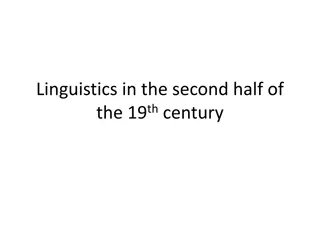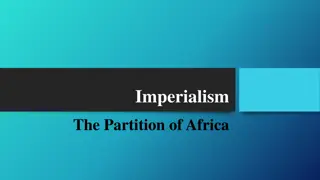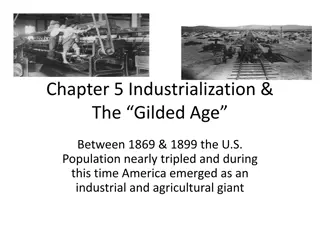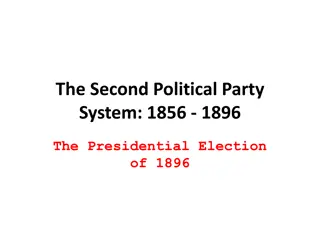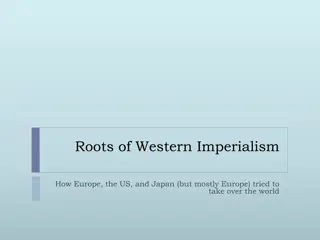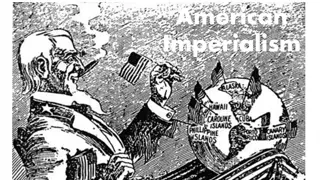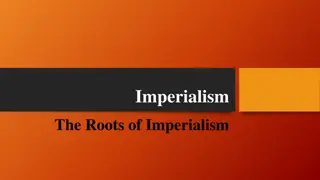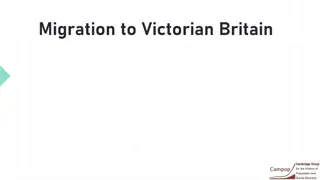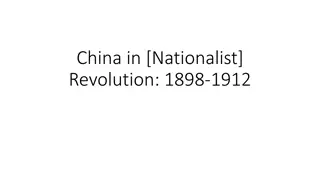European Imperialism in the Late 19th Century
European nations in the late 1800s pursued imperialism to expand their empires for economic, political, and social reasons. Motives included economic interests, political and military ambitions, and the ideology of Social Darwinism. The Industrial Revolution fueled the need for resources and markets, while military bases were established for strategic purposes. European powers believed in their racial superiority and the spread of Western civilization. This period saw significant global expansion by European imperialist nations.
Download Presentation

Please find below an Image/Link to download the presentation.
The content on the website is provided AS IS for your information and personal use only. It may not be sold, licensed, or shared on other websites without obtaining consent from the author.If you encounter any issues during the download, it is possible that the publisher has removed the file from their server.
You are allowed to download the files provided on this website for personal or commercial use, subject to the condition that they are used lawfully. All files are the property of their respective owners.
The content on the website is provided AS IS for your information and personal use only. It may not be sold, licensed, or shared on other websites without obtaining consent from the author.
E N D
Presentation Transcript
Imperialism Building Overseas Empires
Motives for Imperialism In the late 1800s, Western countries wished to join Britain in building overseas empires Imperialism (the domination by one country of the political, economic, or cultural life of another country or region) Europeans began winning empires after 1492 in the Americas, South Asia, and gained toeholds in Africa and China
Motives for Imperialism By the 1800s, strong, centrally governed nation-states had emerged with strong economies due to the Industrial Revolution Empowered by their new economic and military power, Europeans embarked on a path to expand their empires Beginning in the 1870s, Europeans brought much of the world under their influence and control
Economic Interests The Industrial Revolution spurred overseas expansion Manufacturers needed natural resources to fuel their growing needs in the Industrial Revolution They also hoped for new markets where they could sell the goods they produced Colonies provided a valuable outlet for Europe s growing population
Political and Military Motives Merchant ships and naval vessels needed bases around the world to take on coal and supplies/islands and harbors seized from native peoples supplied this need Rival nations in Africa would take land around another nations colony to prevent that countries colony from expanding Felt that ruling a global empire increased that nation s prestige
Social Darwinism Many in the west believed they had a duty to bring the blessings of Western Civilization to the colonized peoples Behind this belief was a growing sense of racial superiority Many had embraced the ideas of Social Darwinism, applying the ideas of survival of the fittest and natural selection to human societies
The Spread of Western Imperialism Between 1870 and 1914, Imperialist nations gained control of much of the world Soldiers, merchants, settlers, and missionaries led the way in imperial expansion, but were supported by all classes of people in Europe
Weakness of Non-Western States While European nations grew stronger in the 1800s, several older civilizations were in decline: Ottoman Middle East, India, and China West Africa: wars among African peoples and the effects of the slave trade led to undermined empires, kingdoms, and city-states
Western Advantages European powers had strong economies, well- organized governments, and powerful armies and navies They also possessed superior technology such as riverboats, the telegraph, and improved medical knowledge Advances in weaponry technology gave European nations a militaristic edge over native peoples
Resisting Imperialism Africans and Asians strongly resisted European expansion into their lands Some people fought despite the difference in weapons technology Other leaders attempted to strengthen their societies by reforming their own Muslim, Hindu, or Confucian traditions
Facing Criticism In the west, a group of anti-imperialists formed Argued that colonialism was a tool of the rich while others claimed it was immoral They pointed out that while the west was moving toward greater democracy, they were imposing undemocratic rule on other peoples
Forms of Imperial Rule Imperial powers developed different kinds of colonial rule The French practiced direct rule, sending officials and soldiers from France to administer their colonies and impose French culture on those colonies The British used a system of indirect rule to govern their colonies
Forms of Imperial Rule The British used sultans, chiefs, or other local rulers to govern their colonies and encouraged those leaders children to get an education in Britain Britain still resorted to military force to keep control over the colony
Forms of Imperial Rule In a protectorate, local rulers were left in place but expected to follow advice of their European advisors Cost less to run than a colony did Did not require a large commitment of military forces Another form of control, sphere of influence, was an area where an outside power claimed exclusive investment or trading privileges









